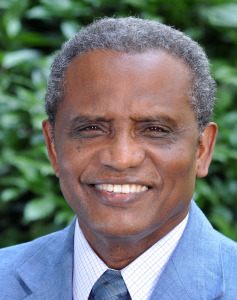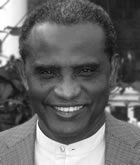2009-2010 Lecture Series

Abdullahi An-Na’im
Charles Howard Candler Professor of Law
School of Law, Emory University
Transcending Imperialism: Human Values and Global Citizenship
Lecture I: The Imperative of Transcending Imperialism: Self-determination for Global Citizenship
Tuesday, March 9, 2010
4:10 p.m. — 6:15 p.m., Toll Room, Alumni House
With commentary by John R. Bowen
Lecture II: Taming Utopia: Pragmatic Means for Transformative Vision
Wednesday, March 10, 2010
4:10 p.m. — 6:15 p.m., Toll Room, Alumni House
With commentary by Muhammad Qasim Zaman and Wael Hallaq
Seminar and Discussion
Thursday, March 11, 2010
4:10 p.m. — 6:15 p.m., Toll Room, Alumni House
With commentary by John R. Bowen, Muhammad Qasim Zaman, and Wael Hallaq
The lectures and the seminar are free and open to the public.
Download and Listen
Contact us at gradlectures.berkeley.edu to request an audio file of this lecture.
About Abdullahi An-Na’im

Abdullahi An-Na’im is an internationally recognized scholar of Islam and human rights, and human rights in cross-cultural perspectives. He promotes a liberal modernist understanding of Islam, and the cultural legitimacy and practical efficacy of international human rights standards. An-Na’im is also concerned with rendering scholarship in the effective service of positive social change. His research interests include law and religion, secularism, civil liberties, constitutionalism in Islamic and African countries, and international law. His Tanner lectures will discuss mediating the paradox of truly inclusive universality of human values in the permanent reality of human difference.
A prolific author, An-Na’im’s books include Toward an Islamic Reformation: Civil liberties, human rights and international law (1990), African Constitutionalism and the Contingent Role of Islam (2006), and Islam and the Secular State: Negotiating the Future of Shari’a(2008). The translations of the manuscript of this book are accessible for download on the Internet in eight languages of Islamic societies. His edited publications include Human Rights in Cross-Cultural Perspective: Quest for Consensus (1992); The Cultural Dimensions of Human Rights in the Arab World (1994); Islamic Family Law in a Changing World: A Global Resource Book (2002); and Human Rights under African Constitutions (2003). As Carnegie Scholar of Islam, his current project is entitled: “Enhancing Citizenship: American Muslims and American Secularism,” in which he seeks to promote the proactive civic engagement of American Muslims into the mainstream of American politics and social activism for social justice for all.
An-Na’im received an LL.B. (with honors) from University of Khartoum, Sudan in 1970; an LL.B. (with honors) and Diploma in Criminology from the University of Cambridge, England in 1973; and a Ph.D in Law from the University of Edinburgh, Scotland in 1976. He served as associate professor at the University of Khartoum, Sudan (1976-85), and Ariel F. Sallows Professor of Human Rights at the University of Saskatchewan, Canada (1988-91). He held the position of visiting professor at the University of California, Los Angeles (1985-87) and Uppsala University, Sweden (1991-92). An-Na’im was the executive director of Human Rights Watch/Africa (1993-95), before joining the faculty of Emory Law School in 1995. He was appointed Charles Howard Candler Professor of Law in 1999, and currently serves as director of the Fellowship Program in Islam and Human Rights at Emory.
About the Commentators
John R. Bowen
Dunbar Van Cleve Professor of Sociocultural Anthropology
Washington University
John R. Bowen is a prominent anthropologist, focusing on broad social transformations now taking place in the worldwide Muslim community. His current research explores the role of cultural forms such as religious practices, aesthetic genres, and legal discourse in processes of social change. Bowen analyzes how Muslims –whether they are judges and scholars, public figures, or ordinary people- work across plural sources of norms and values, including diverse interpretations of the Islamic tradition, law codes and decisions, and local social norms.
Bowen’s first three books, Sumatran Politics and Poetics: Gayo History, 1900-1989 (1991), Muslims Through Discourse (1993), and Islam, Law and Equality in Indonesia: An Anthropology of Public Reasoning (2003), examine issues of religion, culture, and politics in Indonesia, looking outward from a longterm research site in the Gayo highlands of Aceh. In his next two books, Why the French Don’t Like Headscarves: Islam, the State, and Public Space (2007) andCan Islam Be French? Pluralism and Pragmatism in a Secularist State (2009), he looks at Islam in France, focusing on religious signs, new Islamic institutions, and new views on how to interpret Islam. Bowen is currently working on Shari’a Councils in England and North America.
John R. Bowen is Dunbar-Van Cleve Professor in Arts & Sciences, Sociocultural Anthropology at Washington University in St. Louis. He received his B.A. from Stanford University in 1973, and his M.A. and Ph.D. from the University of Chicago in 1977 and 1984, respectively.
Wael Hallaq
Avalon Foundation Professor in the Humanities
Columbia University
Wael Hallaq is a renowned scholar of Islamic law, with numerous contributions to the field of Islamic legal studies. His primary interests include the epistemic institutional ruptures created by the onset of modernity and the many socio-politico-historical forces that come with it, and the intellectual history and development of Orientalism. Hallaq is also concerned with the development of Islamic traditions of logic, legal theory, and substantive law along with the interdependent systems within these traditions.
Hallaq’s writings have explained the structural dynamics of legal change in pre-modern law, and have recently been moving in the direction of asserting the centrality of moral theory to understanding Islamic law, past and present. He is the author of nine books, including most recently The Origins and Evolution of Islamic Law (2005), Shari’a: Theory, Practice, Transformations (2009), and An Introduction to Islamic Law (2009). He’s also edited or co-edited many books and has published numerous articles. He is notable for the international range of his influence: his works have been translated into several languages including Arabic, Indonesian, Hebrew, Japanese, Persian, Turkish and most recently Russian.
Wael Hallaq is the Avalon Foundation Professor in the Humanities at Columbia University, where he began teaching in 2009. He joined McGill University as an assistant professor in Islamic law in 1985, after receiving his Ph.D. from the University of Washington in 1983. He became a full professor in 1994, and was named a James McGill Professor in Islamic law in 2005.
Muhammad Qasim Zaman
Robert H. Niehaus ’77 Professor of Near Eastern Studies and Religion
Princeton University
Muhammad Qasim Zaman is the recipient of fellowships from the National Humanities Center, the Institute for Advanced Study, the Carnegie Corporation of New York and, most recently, the Guggenheim Memorial Foundation.
Zaman is the author of Religion and Politics under the Early ‘Abbasids (1997);The Ulama in Contemporary Islam: Custodians of Change (2002); and Ashraf ‘Ali Thanawi: Islam in Modern South Asia (2008). He is also the co-editor of Schooling Islam: The Culture and Politics of Modern Muslim Education (2007) and of Princeton Readings in Islamist Thought. Zaman’s current projects includeInternal Criticism and Religious Authority in Modern Islam, which examines debates on social and legal reform in South Asia and the Arab Middle East from the late-19th century to the present, as well as a book on Islam in Pakistan.